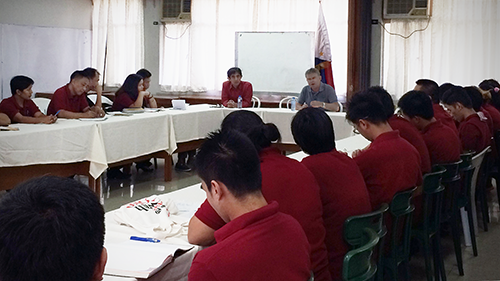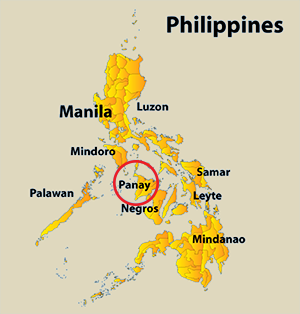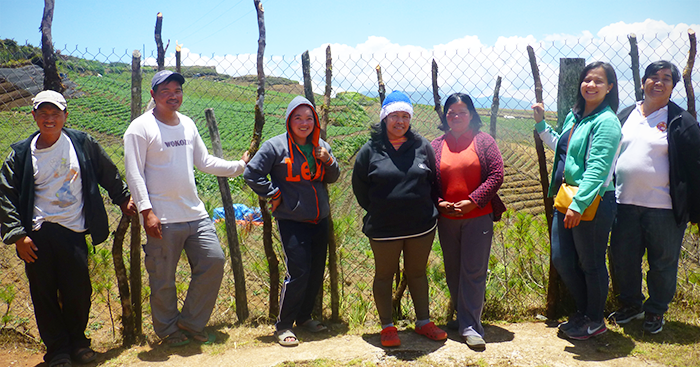ABM Archive Website
THIS WEBSITE CONTAINS ARCHIVE MATERIALS FOR HISTORICAL REFERENCE ONLY
For up-to-date information, including our latest appeals, news, and resources, please visit our current website.
ABM Executive Director visits the Philippines
 |
| Rev John Deane delivers a lecture at St Andrews Theological Seminary. © E-CARE, 2016 |
September 2016
On a recent trip to the Philippines, ABM Executive Director, Rev John Deane, met with our partner The Episcopal Church in the Philippines and visited several project sites.
He also gave a guest lecture at the St Andrew’s Theological Seminary in Manila, addressed to all staff and students.
Rev Deane recounts the busy 10-day trip, detailing the particular projects he was able to visit.
“I had the great pleasure of visiting our partner staff at the Episcopal Church of the Philippines, and their community development foundation, E-CARE (which stands for Episcopal Community Action for Renewal and Empowerment).
 |
“After an overnight stay in Manila, we flew to the island of Panay in the Western Visayas, to the capital of the province Aklan, called Kalibo.
“We went to visit several communities that ABM are supporting through the ‘Receivers to Givers’ program, to meet the beneficiaries and hear their stories. One community, Songcolan, has a series of small livelihood projects through this program. These were established by E-CARE in response to the devastation caused by Typhoon Haiyan in November 2013, and the issue of chronic indebtedness – one of the biggest problems in region. Many farmers and villagers have at least 3 different loans that they are trying to service, all carrying exorbitant rates of interest. With no other financing available, they are often trapped in a vicious cycle of debt, unable to get ahead through their hard-work. This puts enormous pressure on families, who all struggle to make the repayments.
“Through the E-CARE program, funding was made available to community members in Songcolan, helping them to pay off their debts and establish profitable businesses. This single grant is then repaid to the program over time, without the burdensome rates of interest.
“This system benefits the whole community, as cooperatives are set up to manage the money, and distribute funding to those with new business initiatives or separate cooperatives. While I was there, I attended a ceremony where the members of the Seashore Songcolan Livelihood Association (SSLA) passed on funding raised through their project to another cooperative, the Palay Small Entrepreneurs Association (PSEA). It was a special moment, and very empowering for both groups.
“Originally, the beneficiaries of the funding in Songcolan were fishermen, who had lost all their equipment in the typhoon and needed help to re-start their fishing businesses. However, many of the people now benefiting are women, who often set up small food businesses, including food production, processing and catering. It’s all local produce, like bananas and other food produced in these areas.
 |
| Livelihood beneficiaries from another region in the Philippines pose with E-CARE staff in early 2016. © E-CARE, 2016 |
“This is a new mission district for the Episcopal Church of the Philippines. They were excited in approaching the community through a ‘Community Development’ lens, rather than focusing on traditional ‘Church planting’. They found that this brought a closer relationship and greater engagement with the community. People clearly respected the Church for being up-front about what they were doing, and appreciated the expertise E-CARE had to implement these projects, and help with individual business development activities.
“From the local communities where the program was run, there was a high percentage of people who took advantage of the loans. This support from the Church was unique in this area. It actually stirred other churches in the Western Visayas to establish similar projects, because the success and demand for these was obvious to everyone.
“The Episcopal Church of the Philippines see this type of program as ‘preaching without words’, providing a living witness to the gospel through their social action.”
“From there, I attended a meeting with E-CARE Development Officers in Boracay, and received an update on the various programs ABM are supporting.
“Next was a visit to St Andrew’s Theological Seminary in Manila, where I was to give a 3-hour guest lecture on ‘Mission and Development’. To briefly summarise, the lecture was split into three parts;
- Discussion of the importance of relationship and hospitality in the context of mission, and the history of the relationship between ABM and the Episcopal Church of the Philippines.
- Review what the Bible taught about mission, using stories from Genesis to highlight God’s overarching vision for human kind, and our role in God’s plan for creation.
- Discussion of the outworking of this theological teaching in practise, and reflection on some of the work that we were doing together, and some of the ways we were approaching mission i.e. through various partnerships
“The lecture was concluded with a challenge to these theological students, to see development not as an extra ‘bit’ but as an integral and essential part of what it means to be engaged in mission.
“Several more meetings with the National Development Officer, Atty. Floyd Lalwet, came next, including conversation about the extension of the Church to Church ‘Encounter Program’, which has proved popular in facilitating exchanges between Australian and Filipino clergy.
Overall, it was an inspiring and productive trip. The Church in the Philippines is doing such great work, and I’m confident this will only continue to increase and expand in the future.”


